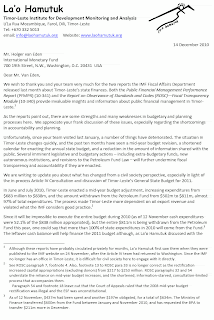We wrote "As the (IMF) reports point out, there are some strengths and many weaknesses in budgetary and planning processes here. We appreciate your frank discussion of these issues, especially regarding the shortcomings in accountability and planning.
"Unfortunately, since your team visited last January, a number of things have deteriorated. The situation in Timor-Leste changes quickly, and the past ten months have seen a mid-year budget revision, a shortened calendar for enacting the annual state budget, and a reduction in the amount of information shared with the public. Several imminent legislative and budgetary actions – including extra-budgetary funds, new autonomous institutions and revisions to the Petroleum Fund Law – will further undermine fiscal transparency and accountability if they are enacted. ..." Our five-page letter described recent developments, corrected erroneous or outdated information, and filled in some gaps in the IMF reports.
In January, the IMF wrote back: "Thank you very much for your in-depth review... The content of your letter is very useful for us in further advising the government on strengthening fiscal transparency and the public financial management system in Timor-Leste. ...
"We very much appreciate La'o Hamutuk's constructive input and dialogue on public financial management issues. With your government's permission, we hope to continue that dialogue in coming years."
La'o Hamutuk will continue to share information with the IMF, the public and others without asking for permission from the government of the day. The right to do this is enshrined in Articles 40, 41, 46 and 48 of the Constitution of the Democratic Republic of Timor-Leste. We hope that many people and institutions will speak up about important public issues, and not be deterred by the increasing tendency of some officials to "shoot the messenger" who provides information that they would rather nobody knows about.






No comments:
Post a Comment